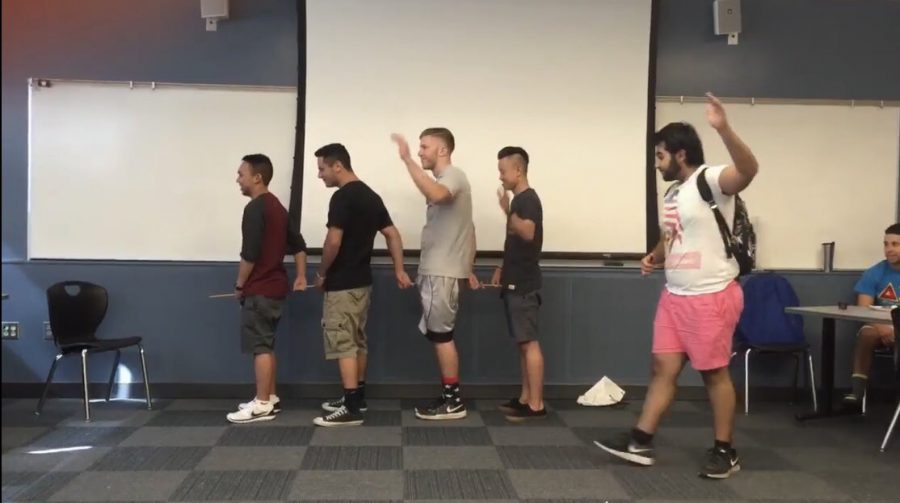2019 Sac State Greek troubles continue
A timeline of anonymous allegations and ongoing investigations
Anonymous – The State Hornet
Sacramento State is investigating a potential hazing incident after an anonymous person emailed The State Hornet and President Nelsen’s interim chief of staff Cely Smart. The sender described the photo as depicting an imitation of ‘the elephant walk,’ a hazing practice where members stand in a line or circle and walk while holding the genitals of the person behind them.
Sparked by an anonymous email and others that followed, Sacramento State’s Greek life has faced investigation, scrutiny and even international attention since late January.
Fraternities and sororities at Sac State compose a niche of the general student population, with about 1,400 students — roughly 4.7 percent of the student body — involved with Greek life.
The university has 45 different chapters, with membership ranging from five to 100 students each.
According to Sac State’s Greek life home page, fraternity and sorority life goes beyond wearing Greek letters or attending meetings and social events — it’s about building long lasting friendships and enhancing personal development.
In terms of the “scholarship, leadership and service” they offer to prospective and current members, much of Greek life revolves around philanthropy. Sac State’s Greek community raised around $194,521 for philanthropic causes during the 2017-2018 school year, according to Student Organization & Leadership.
RELATED: Sac State students weigh in on Greek life’s purpose
But often-associated stereotypes plague Greek life all around the nation. Much in line with an anonymous email sender’s allegations sent to The State Hornet, the university and other media outlets, a University of Maine study from 2007 — the most recent of its kind — found that 73 percent of students in fraternities and sororities experienced what they called hazing at least once.
After almost a month of anonymous allegations and at least three confirmed investigations, The State Hornet has filed public records requests with Sac State in relation to the allegations detailed in the emails.
Sac State’s Delta Chi chapter declined multiple requests for comment before the fraternity was ordered to cease and desist all activities, deferring to Delta Chi’s international headquarters.
Ben Ely, director of communications and publications for Delta Chi’s international headquarters, contacted The State Hornet with a statement on the investigation Thursday.
“Hazing has no place in Delta Chi and is in direct violation of our values as a fraternity and our basic expectations,” Delta Chi’s statement said. “We take these allegations seriously and will continue to investigate the matter to reach a positive and proper outcome.”
JUST IN: @sacstate is investigating an alleged hazing incident with the university’s chapter of the Delta Chi fraternity. An anonymous source sent a copy of their complaint to The State Hornet, which included this photo. Story to come, follow @TheStateHornet for updates. pic.twitter.com/NFs9yKs22B
— Margherita Beale (@margheritabeale) January 28, 2019
First Delta Chi tip and investigation
On Jan. 28, an anonymous email was sent to both The State Hornet and university officials, detailing what the sender described as hazing events encouraged by members of Sac State’s Delta Chi chapter and other social Greek life organizations.
Two days later, Sac State officials announced an official investigation into Delta Chi. At the time of publication, the investigation is still ongoing.
The email included a picture, which the anonymous sender described as depicting “Delta Chi members participating in a simulation of what appears to be ‘the elephant walk,’ a form of known hazing in fraternities.”
RELATED: Investigation into Sac State fraternity continues
Baron Nguyen, who attended Sac State for two years, spending one as a member of Delta Chi, identified himself as being in the photo that was anonymously sent to university administration and The State Hornet.
Nguyen said the photo was taken at a new member event in the Academic Information Resource Center in 2015.
Official logs show that Delta Chi was given a warning for hazing in 2015, which was also the first year the chapter was allowed back on campus after a suspension for a rules violation that included hazing.
According to Beth Lesen, associate vice president for student affairs and dean of students at Sac State, any allegation of hazing is investigated by the university. Not only is hazing not tolerated at Sac State, but it is illegal in California, as prescribed under Penal Code 245.6.
Second Delta Chi tip
A little more than a week later, The State Hornet and The Sacramento Bee received a second anonymous email with an attached video described to show the hazing of a current member of Sacramento State’s Delta Chi chapter.
The video is said to show the alleged member being “kidnapped” in 2017. The video shows a man bound and gagged on a table as others hold their cellphones and laugh.
According to Lesen, the emergence of the video caused the investigation to be delayed further. At the end of the investigation, the national director of the fraternity will issue a statement regarding its findings, Lesen said.
Cease and desist
On Feb. 8, Student Organizations & Leadership at Sac State sent the president of Delta Chi, Andrew Vonwal, a cease and desist letter, informing the chapter that they cannot operate as a student organization until the investigation is over. This means that the chapter cannot conduct any fraternity-related business, including events and meetings until that time.
“Failure to abide by that order could result in the immediate removal of recognition from the University,” Sac State said in a statement.
RELATED: Sac State orders Delta Chi fraternity to ‘cease and desist all activity’
According to Lesen, the fraternity is being “cooperative, forthright and responsive” with the investigation.
National media coverage
Since the first photo was anonymously sent, Greek life at Sac State has garnered national attention. The story was picked up by various news organizations, such as The New York Post, the New York Daily News, The Sacramento Bee and The Daily Mail.
Pi Kappa Alpha tip and resolution
Sac State’s Pi Kappa Alpha chapter was under investigation for one day after university officials discovered a video anonymously sent to The State Hornet Feb. 12 was part of a previous investigation.
The video shows what is said to be a pledging member of Pi Kappa Alpha vomiting from excessive drinking during a house party within the first weeks of the spring 2018 semester.
The video, sent by an anonymous email address, was at the center of an investigation into Pi Kappa Alpha that started in January 2018.
RELATED: Sac State Pi Kappa Alpha chapter no longer under investigation
The fraternity was placed on probation and after later violating terms of that probation, the university officially removed recognition from Pi Kappa Alpha in August 2018, Sac State’s Director of News and Communications Brian Blomster said in a statement Feb. 13.
The decisions came from Sac State’s Office of Student Organizations & Leadership, the Interfraternity Council (IFC) and Pi Kappa Alpha’s national headquarters.
“In December 2018, based on PKA’s progress toward meeting the terms set by the IFC and internal membership review, IFC reinstated recognition of PKA. The University recognized the fraternity again in January 2019,” the statement said.
Pi Kappa Alpha is scheduled to remain on probation until May 31.
State Hornet PRAs
As of the time of publication, The State Hornet has issued three separate California Public Records Act requests — all cases of reported and alleged hazing since 2015, all cases of reported punishment since April 2017 and Greek life average graduation rates and grade point averages since 2015.
The second will act as a continuation of a request filed by The State Hornet in 2017, which seemingly corroborated many of the allegations of misconduct listed by the first anonymous email.
RELATED: 2-year report on Greek life violations reveals laundry list of problems
The records request also revealed numerous instances of reported misconduct among Greek organizations, including sexual violence and harassment, substance abuse and hazing, as well as efforts to thwart investigations into such matters.
This story was updated Friday, Feb. 22, to include a statement from Delta Chi’s international headquarters.
This story was updated Sunday, Feb. 24, to correct the spelling of Andrew Vonwal.
Your donation will support the student journalists of Sacramento State University. Your contribution will allow us to purchase equipment and cover our annual website hosting costs.



























































































































